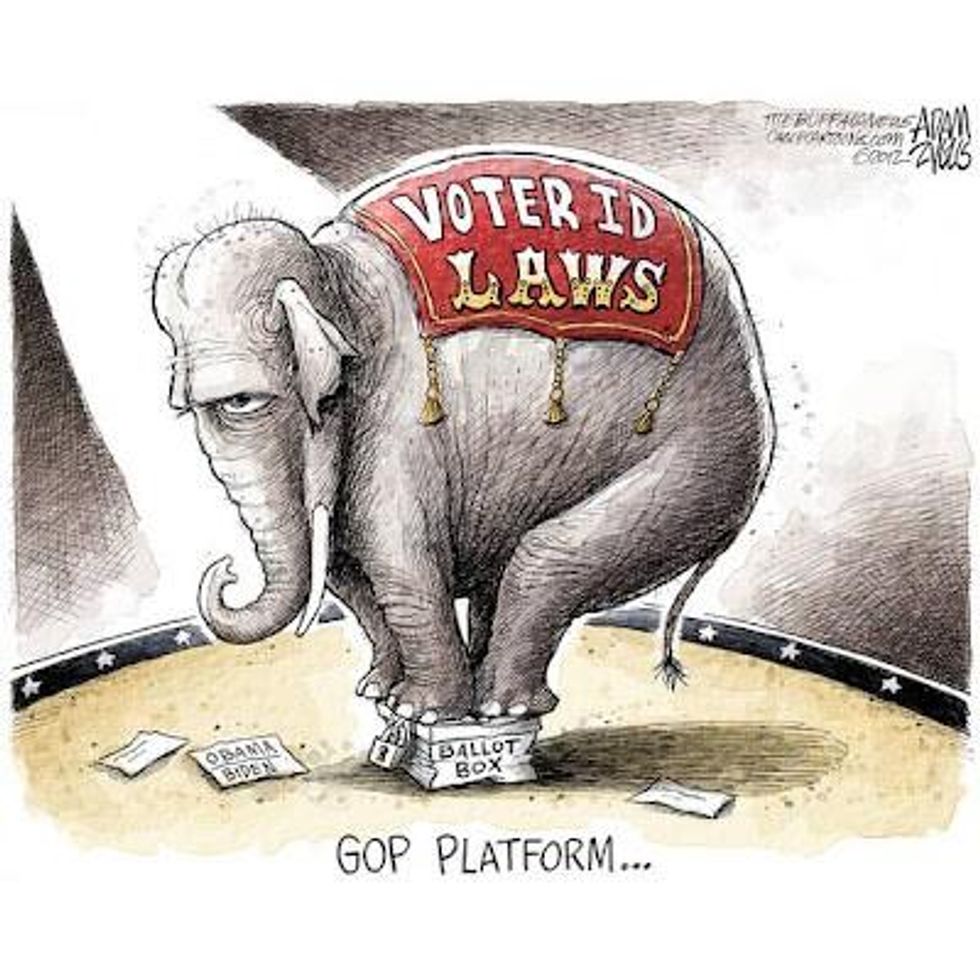The Ohio Republican Party has moved four ways to steal America's 2012 election. The Buckeye State is almost certain to emerge as a decider in this year's presidential election, and the GOP is moving fast to ensure victory, no matter what it takes.
The strategy reflects much of what was done by the
Republicans in 2000 and 2004 to steal those presidential elections for George W. Bush, as we report in the newly published
Will the GOP Steal America's 2012 Election?
If they get away with it, the Ohio GOP could make it virtually impossible for Barack Obama to carry Ohio this November. In the years since Florida 2000 and Ohio 2004, the Democratic Party has made little headway in reforming our electoral system to make such thefts impossible:
1. Since 2009, the Ohio GOP has purged roughly a million citizens from the state's voter rolls. This accounts for some 15% of the roughly 5.2 million votes counted for president in the state in 2008.
The purge focuses on counties that are predominantly urban and Democratic.
2. Electronic voting machines have been installed throughout the state
which are owned, operated, programmed and maintained -- and will be tallied -- by Republican-connected firms.
3. The GOP controls both houses of the Ohio Legislature, the governorship, the Secretary of State's office, and the state
Supreme Court. Soon after the 2008 election, it imposed a draconian photo ID law designed to disenfranchise hundreds of thousands of suspected Democrats, as is being done throughout the US. But Ohio is a referendum state. A statewide grassroots movement recently crushed a GOP-pushed anti-labor law, and many Republicans feared the photo ID law would also go down. Then GOP stalwart Jon Husted (now the Secretary of State) was ruled ineligible to hold office over a residency conflict. Ohio's Supreme Court re-instated his eligibility, but he was prompted to oppose the photo ID law. Today a prospective Ohio voter can use 17 different kinds of ID, but in recent elections some poll workers have demanded photo ID anyway. Without a grassroots army of independent election monitors to protect them, many more Ohioans are likely to be disenfranchised.
4. In 2004, 10.6% of the votes cast in Ohio were so-called "early votes" via absentee ballots. A voter had to be absent from the county to vote absentee. In-person Election Day voters at the 42 predominantly black inner-city precincts in Columbus waited between 3-7 hours to vote.
In 2005, Ohio election law was modified so absentees could vote without actually being absent from their home county. When Ohio went for Barack Obama with 52% of the vote, early voting nearly tripled to 29.7%. This included voters able to vote in person at locations all over the state for 35 days prior to Election Day, including on weekends.
This summer the Ohio GOP attempted to allow Republican counties to use weekend voting, while denying the right to counties that are predominantly Democratic. By banning all voting the weekend before the election, Husted took credit for "leveling the playing field." But African-American State Representative Charleta Tavares immediately charged that the exclusion of weekend voting represented a deliberate attempt to suppress Democratic voters, and particularly black voters who voted 95% for Obama in 2008.
On Friday, August 17, while some 500 Ohioans protested outside his office, Husted suspended Democratic Montgomery County (Dayton) Board of Election members Dennis Lieberman and Tom Ritchie, Sr. because they introduced and supported---and then refused to rescind---a motion for weekend voting.
Lieberman told the Dayton Daily News that, "I believe that this is so critical to our freedom in America . . . that I'm doing what I think is right, and I cannot vote to rescind this motion." Lieberman also argued that the directive did not specifically prohibit weekend hours.
The Ohio Association of Election Officials, overwhelmingly dominated by Republicans from Ohio's rural counties, endorsed the idea of cutting the final three early voting days. They argued that they needed the extra time over the weekend to prepare for Election Day, although some of the counties have very small voting populations compared to the nine urban counties that support keeping the three final early voting days. Doug Priesse, Chair of the Franklin County (Columbus) GOP, sparked a firestorm when he explained that "I guess I really actually feel we shouldn't contort the voting process to accommodate the urban -- read African-American -- voter turnout machine."
The Obama campaign has sued, arguing that weekend voting be restored for all Ohioans, as it has been for members of the military. The GOP has charged Obama with trying to deny those in the military their right to vote, which would be impossible for him to do. Husted and GOP Attorney-General Mike DeWine responded with a suit saying: "There is no fundamental right to in-person early voting."
Under intense pressure, Husted has since re-instated the two Dayton Election Board members. But by purging registration lists, limiting voting times, messing with voter ID requirements and controlling electronic voting machines, the GOP has a huge leg up on winning what has often been America's key swing state.
Clearly the Ohio GOP is once again geared up to deny the vote---and vote count---to as many Democrats as it can. If it succeeds, as it did in 2004, Barack Obama stands little chance of being re-elected.






